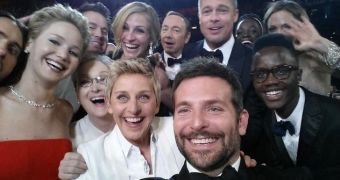Welcome to consumerist America! The land where all genuine feelings are being drained by money-hungry corporations. While that’s a pretty harsh statement, company giants such as Samsung are making sure that it is true by using unconventional means of promoting their products at the price of destroying reality in media.
By now, most of you good people out there might have heard about the selfie fad. A selfie is a photo you take of yourself, generally in a joyous occasion or with someone special. A good moment to take a selfie would be when meeting the president for the first time for example.
But what happens when the company making the phone with which selfies are taken decides it gets a word into which photo opportunities they want to control and subsequently promote? what happens is that in the era of “reality TV” you get a lot of trickery that has a lot to do with money and creating a false message to consumers.
The moral issue is that Samsung is breaking the boundaries of usual commercials by employing some previously unseen guerilla tactics. For example, when Ellen DeGeneres hosted the 2014 Oscars and decided to take a selfie with the most famous actors in the room, everyone thought it was a very cool thing to do and reshared that photo until they damn well broke Twitter.
What people didn’t know was that they were being taken for a ride. While they fawned over the photo, Samsung had secretly made a deal with DeGeneres to take the photo using their phone, despite the fact that she used an iPhone on a regular basis.
The trickery was exposed when, a week later, Ellen was giving out free Samsung phones during her show. It then dawned on people that what should have been a beautiful and spontaneous moment, was actually a shameless plug for Samsung.
If you reshared that photo, wrote about it, mentioned it in a casual conversation or talked about it at parties, you unwittingly promoted Samsung and you should call them up and ask to be paid for the publicity you’ve given them.
The reactions after the event were mixed. While advertisement companies praised the viral marketing techniques as genius and groundbreaking, not to mention very profitable, people felt cheated and used.
But Samsung didn’t care. Their promotion didn’t stop with the Oscar selfie, it went on with the presidential selfie scandal. When Red Sox baseball player David “Big Papi” Ortiz went to meet with President Barack Obama at the White House, he marked the occasion with, what else, but a selfie.
Later, the White House got wind that not even the President of the United States was safe from falling into product placement scams. It turned out that Ortiz was contractually obliged to take the photo with Obama and then share it on social media, praising Samsung in the process.
Obama’s team was not pleased at all when they learned that the president’s image was used in promoting products for a company and they warned that they might ban presidential selfies altogether from now on.
So if you’re a 6-year-old who meets the President for the first time and wants to take a photo with him to show to your friends and family, you can’t anymore and you have Samsung to thank for that.
The mastermind behind this extensive media campaign for Samsung is Levy’s Publicis Groupe, a Paris-based global advertising and marketing company, that handles this kind of promotion for the electronics giant.
Speaking in a press conference, CEO for the company, Maurice Levy, wasn’t coy when he admitted the fact that his agency was behind the two scandals and he was in fact flaunting their success. He valued the Oscar selfie at one billion dollars, based on the number of times that it had been shared on social media.
“This is something we did for Samsung. It's us. The two selfies that are so famous -- the one with all the actors at the Oscars and the second with President Obama -- the two were done by our team,” Levy said proudly.
When asked how much money this viral campaign made, he declined to give any information, but, based on the impact they had, you can guess that it was very profitable for both parties involved. Using a slang term from the industry, “you can’t buy that kind of publicity” because people don’t see it as a regular commercial, the kind you can skip or turn off and that is being served to you outside of the show in 30 second portions.
That’s why it’s so effective and dangerous at the same time, because it’s embedded in the very fabric of the show that the majority of people perceives as reality. People believe that the innocent photo taken with smiling people is genuine and comes from the honest desire to capture a happy moment, they don’t know that behind the arm holding the phone in a way that it’s visible for the entire world, there is a contract and probably some very handsome sums of money for those involved.
I would really like to know what other people think of this, so if you have an opinion on the matter, please leave a comment below. Choose a side: are you for a viral marketing campaign that exploits feelings and unaware people or are you against such practices?

 14 DAY TRIAL //
14 DAY TRIAL //